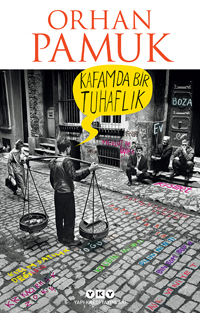I was cooking halva, the special kind that's made of flour and butter after someone dies. My tears were falling into the pot, disappearing among the little clumps of flour and sugar, and with each tear that vanished, I felt like another memory was gone. Would we run out of butane gas? Should I have put a bit more meat in the vegetable stew? Whenever people got tired of crying, they came into the kitchen and lifted the lid off a pot to stare quietly at its contents. As if crying for a long time meant you could come over and see what was cooking.I came to the end of A Strangeness in My Mind, by Orhan Pamuk, and my initial comments stand: it's mostly boring and a little sad. The character Mevlut is somewhat unlikeable, and for all the tedious detail of his life, his motivations and actions remain opaque to me.
Maybe that's the point. That no matter our upbringing and environment, no matter our experiences and outlook on issues, we still end up doing dumb things. Well, not dumb, necessarily, but we still sometimes base our words and actions on something ineffable, that doesn't jive with what our psychological makeup would indicate, or that contradicts our views, whether stated or assumed. We just muddle through life, and it doesn't always make sense.
The latter part of the novel makes a big deal of our words versus our intent. And it's still not clear to me which is meant to be more important.
So this isn't one of my favourite Pamuk books. It's two stories really — a love story, which I found intriguing, and the ongoing tribulations of a street vendor, which failed to engage me — and in my view they don't fit very comfortably together.
Between Public and Private: Orhan Pamuk on the Intentions of Words and the Heart



No comments:
Post a Comment